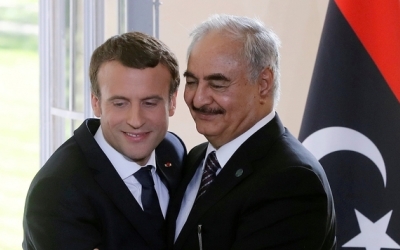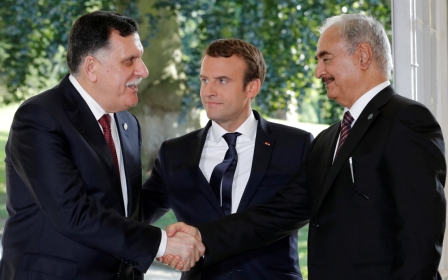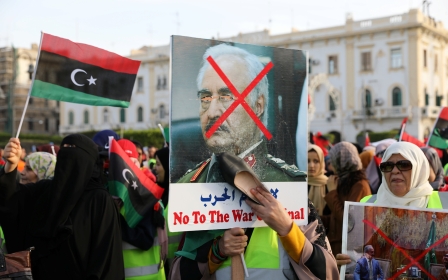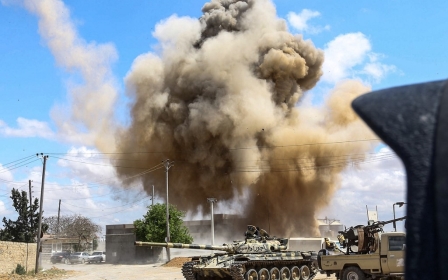Men with French passports crossing from Libya are linked to Haftar: Tunisian source
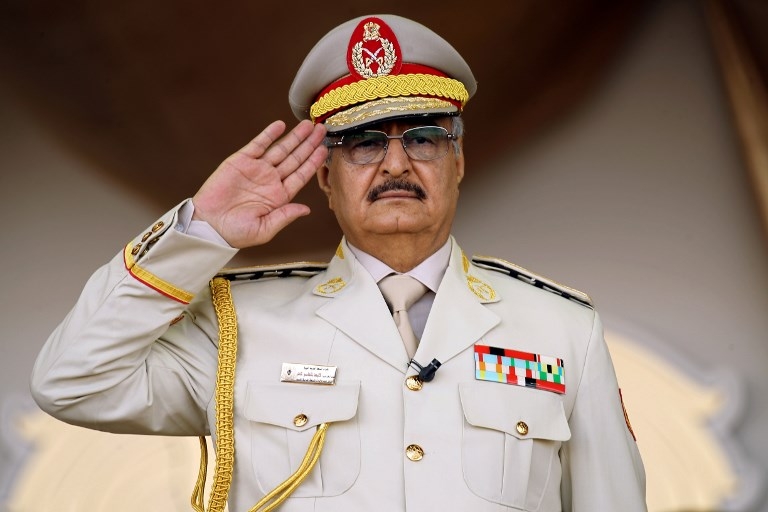
Thirteen armed men with French diplomatic passports, who were detained in Tunisia last week while crossing from Libya, were providing logistical support to the forces of Libyan general Khalifa Haftar in his offensive on Tripoli, Tunisian sources have told Middle East Eye.
Paris dismissed the incident through its embassy in Tunis last week, saying that the individuals were a part of the security detail to "ensure the safety" of the country's ambassador in Libya.
MEE has obtained photos of the squad's passports - all men between their mid-20s and mid-30s.
The group was stopped while attempting to cross into Tunisia through the coastal crossing of Ras Ajdir. They had arms and ammunition, according to Tunisian officials.
New MEE newsletter: Jerusalem Dispatch
Sign up to get the latest insights and analysis on Israel-Palestine, alongside Turkey Unpacked and other MEE newsletters
A separate group of European citizens was also intercepted by Tunisian authorities last week while trying to cross into the country from Libya by sea.
MEE contacted the French Foreign Ministry for comment on the allegations, but did not receive a response at the time of publication.
France has a long history of covert military operations in Libya.
The presence of French special forces in Benghazi, which Haftar was trying at the time to wrest from groups of Islamist fighters loyal to Tripoli, was revealed when a helicopter on a surveillance mission crashed, killing three French soldiers in July 2016.
A month later, the French were reported to have withdrawn from the city in eastern Libya, but in September that year, MEE revealed that British, French and US air-traffic controllers in Benina airport were helping Emirati pilots bomb Islamist positions in the city.
In January, Italy's Deputy Prime Minister Matteo Salvini of the far-right League party accused France of exploiting the unrest in Libya to benefit oil company Total, which competes with Italy's ENI in the development of energy assets in the area.
'We don't want Libyans to hate France'
Allegations of French support for Haftar, including forces on the ground, are potentially embarrassing for France, especially after Paris expressed support for "the legitimate government of Prime Minister Fayez al-Sarraj and the mediation of the UN”.
Last week, the European Union also recognised the government in Tripoli and German Chancellor Angela Merkel condemned Haftar.
On Wednesday, Sarraj accused France of supporting Haftar whom he described as a "dictator".
"We are surprised that France does not support our government that is democratic, but supports a dictator," Sarraj told France's Liberation and Le Monde newspapers in comments published in French.
"When [French president] Emmanuel Macron called me, I warned him that public opinion was against France. We don't want Libyans to hate France. France still has a positive and important role to play," he said.
Last Thursday, the interior ministry in Tripoli suspended all security agreements with France.
Haftar advance did not go as planned
After seizing much of the country's east from various militias, Haftar, a former general backed by the United Arab Emirates and Russia, moved this month to capture Tripoli from the internationally recognised government there.
The capital has been rocked by repeated clashes between rival militias amid the government's inability to assert its control over different armed groups, causing scores of casualties and forcing thousands to flee the fighting.
A Tunisian official, who spoke to MEE on the condition of anonymity because of the sensitivity of the matter, said Haftar had been planning to enter Tripoli "unopposed" after exploiting divisions in the pro-government camp, but things did not go as planned.
Before Haftar's offensive on the Libyan capital, Misrata militants had withdrawn from Tripoli, and Abdel Hakim Belhaj, a rebel commander who played a decisive role in toppling Muammar Gaddafi in 2011, had disbanded his forces.
"So Haftar was hoping that by getting his people to come out, he could just walk in," the Tunisian official said.
Algeria connection
The Tunisian official added that Haftar timed his campaign with the transition in Algeria where former President Abdelaziz Bouteflika was facing massive protests that led to his resignation earlier this month. Algiers had opposed the offensive on Tripoli.
"He thought Algeria would be too distracted with its own issues to mount any effective campaign against his," the official said.
But competing militias in the Libyan capital unified their ranks to thwart Haftar's plans.
"Haftar's blitzkrieg did not work, so now it's 'Plan B': indiscriminate attacks from the air on civilian targets," he added.
The source said if the militias manage to "absorb Haftar's attack", they may put him in a difficult situation amid mounting international condemnation that will limit the air support he had previously received from the Emiratis.
"Mounting daylight air attacks is a sign of desperation," the source said.
On Tuesday, Sarraj's forces were reported to have pushed back troops loyal to Haftar to more than 60 km southwest of Tripoli.
This article is available in French on Middle East Eye French edition.
Middle East Eye delivers independent and unrivalled coverage and analysis of the Middle East, North Africa and beyond. To learn more about republishing this content and the associated fees, please fill out this form. More about MEE can be found here.



